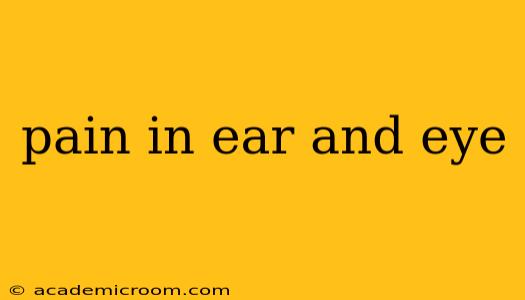Experiencing pain in both your ear and eye simultaneously can be alarming and confusing. This symptom isn't a single condition, but rather a potential indicator of several underlying issues, ranging from relatively minor infections to more serious neurological problems. This comprehensive guide will explore the possible causes, help you understand when to seek immediate medical attention, and provide insights into potential diagnoses and treatments.
What Could Cause Pain in My Ear and Eye?
The correlation between ear and eye pain often stems from their close anatomical proximity and shared neural pathways. Inflammation or infection in one area can easily affect the other. Here are some of the potential causes:
-
Ear Infections (Otitis Media or Otitis Externa): A common cause, particularly in children. Inflammation and pressure buildup in the middle ear (otitis media) or outer ear (otitis externa) can radiate pain to the eye area. Symptoms may include fever, hearing loss, and discharge from the ear.
-
Sinusitis: Infection or inflammation of the sinuses (air-filled spaces in your skull) can cause pressure and pain that spreads to the ears and eyes. This is often accompanied by facial pain, nasal congestion, and headache.
-
Dental Issues: Problems like an abscessed tooth or severe gum infection can cause referred pain to the ear and potentially even the eye.
-
Migraine Headaches: While the pain itself may be primarily felt in the head, migraines can cause associated pain in the ears and eyes. Other symptoms like nausea, vomiting, and sensitivity to light are common.
-
Cluster Headaches: These severe headaches can involve intense pain around the eye and sometimes affect the ear area as well.
-
Temporal Arteritis (Giant Cell Arteritis): A serious condition affecting the arteries in the head and neck. It can cause severe headaches, jaw pain, and vision problems. Pain in the ear may be a less common symptom.
-
Referred Pain from Other Sources: Pain from other areas of the head or neck can sometimes be felt in the ear and eye due to nerve pathways. The exact origin may be difficult to pinpoint.
-
Eye Infections (Conjunctivitis, Keratitis): While typically associated with eye pain, some serious eye infections can potentially lead to discomfort radiating to the ear region, especially if accompanied by inflammation and pressure.
What if I Have Pain in My Ear and Eye and a Fever?
A fever accompanying ear and eye pain significantly increases the likelihood of an infection, such as otitis media, sinusitis, or a more systemic infection. Seek medical attention immediately if you experience a fever along with this pain.
When Should I See a Doctor for Ear and Eye Pain?
You should seek immediate medical attention if:
- Your pain is severe or sudden.
- You have a fever.
- You experience vision changes, such as blurry vision, double vision, or loss of vision.
- You have severe headache alongside ear and eye pain.
- You have discharge from your ear.
- You experience swelling around your ear or eye.
- Your symptoms don't improve after a few days of home treatment (such as over-the-counter pain relievers).
Is Pain in My Ear and Eye Serious?
The seriousness depends entirely on the underlying cause. While some causes are relatively minor and treatable with home remedies or over-the-counter medication, others necessitate immediate medical attention. The information provided here is for general knowledge and should not replace professional medical advice.
How is Ear and Eye Pain Diagnosed?
Diagnosis typically involves a thorough physical examination, including a check of your ears, eyes, sinuses, and possibly your teeth and neck. Additional tests may include:
- Otoscopy: Examination of the ear canal and eardrum.
- Visual Acuity Testing: To assess your vision.
- Imaging Tests (X-rays, CT scans, MRI): To rule out more serious conditions.
- Blood Tests: To check for infection or inflammation.
What are the Treatment Options for Ear and Eye Pain?
Treatment will depend on the underlying cause and may include:
- Antibiotics: For bacterial infections.
- Antiviral medications: For viral infections.
- Pain relievers: Over-the-counter medications like ibuprofen or acetaminophen can help manage pain and fever.
- Decongestants: To relieve nasal congestion associated with sinusitis.
- Eye drops or ointments: For eye infections.
- Surgery: In rare cases, surgery may be necessary.
Disclaimer: This information is for educational purposes only and should not be considered medical advice. Always consult with a healthcare professional for any health concerns or before making any decisions related to your health or treatment. Self-treating can be dangerous, and prompt medical evaluation is crucial for accurate diagnosis and appropriate management of ear and eye pain.
